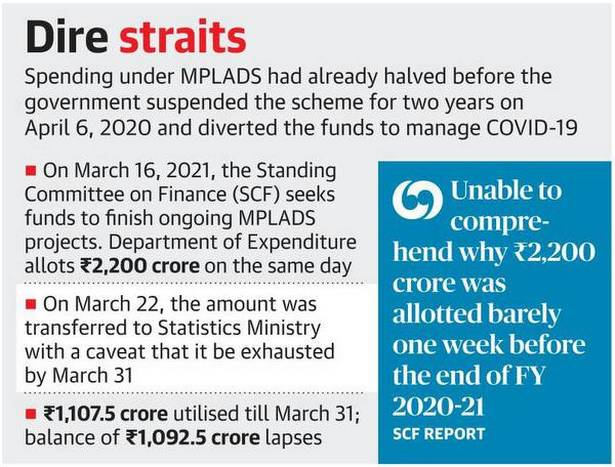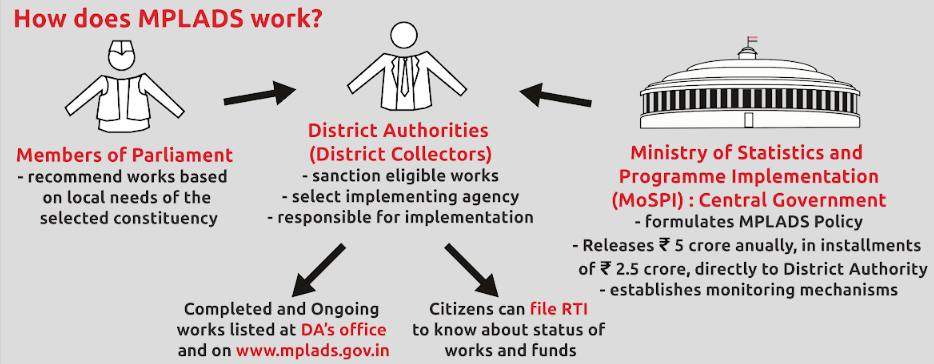Governance
Funds Lapsed in MPLADS
- 06 Aug 2021
- 4 min read
Why in News
Recently, the Standing Committee on Finance has criticised the decision of the Ministry of Finance (Department of Expenditure) for giving barely a week’s time to the Ministry of Statistics and Programme Implementation (MoSPI) for funding ongoing Member of Parliament Local Area Development Scheme (MPLADS) projects, owing to which 50% funds lapsed.
Key Points
- Findings of the Committee:
- Impact on the Projects: The resultant funding crunch would have hit several local area development projects under implementation across the country.
- Especially in the States that went to polls this year as no funds were released for these States and constituencies citing the Model Code of Conduct.
- Ad-hocism in Policy: Under MPLADs, funds released to district authorities are not lapsable, while funds not released by the government in a particular year are carried forward.
- However, the decision of the Ministry of Finance that made funds lapseble, constitutes ad-hocism and a serious lapse in fiscal management with negative consequences for communities across India.
- Impact on the Projects: The resultant funding crunch would have hit several local area development projects under implementation across the country.
- About the MPLAD Scheme:
- MPLAD is a Central Sector Scheme which was announced in December 1993.
- The objective of the scheme is to enable the Members of Parliament (MP) to suggest and execute developmental works of capital nature based on locally felt needs with emphasis on creation of durable assets.
- Initially, it came under the control of the Ministry of Rural Development. Later, in October 1994, it was transferred to the Ministry of Statistics and Programme Implementation.
- Functioning:
- Each MP is granted Rs. 5 crore under the scheme, adding up to Rs. 3,950 crore a year for 790 MPs, to undertake development projects in their respective constituencies.
- Lok Sabha MPs have to recommend the district authorities projects in their Lok Sabha constituencies.
- Rajya Sabha MPs have to spend it in the state that has elected them to the House.
- Nominated Members of both the Rajya Sabha and Lok Sabha can recommend works anywhere in the country.
- Priority Projects:
- The projects include asset building such as drinking water facilities, primary education, public health sanitation and roads.
- Since June 2016, the MPLAD funds can also be used for implementation of the schemes such as Swachh Bharat Abhiyan, Accessible India Campaign (Sugamya Bharat Abhiyan), conservation of water through rain water harvesting and Sansad Aadarsh Gram Yojana, etc.
- Other Issues Related to MPLADS:
- Implementation Lapses: The Comptroller and Auditor-General of India (CAG) has flagged instances of financial mismanagement and artificial inflation of amounts spent.
- No Statutory Backing: The scheme is not governed by any statutory law and is subject to the whims and fancies of the government of the day.
- Monitoring and Regulation: The scheme was launched for promoting participatory development but there is no indicator available to measure level of participation.
- Breach of Federalism: Union Government can incur expenditure only with respect to matters over which it has subject domain as per seventh schedule.
- MPLADS encroaches upon the domain of local self governing institutions and thereby violates Part IX and IX-A of the Constitution.
- Conflict with Doctrine of Separation of Powers: The Scheme disturbs the scheme of separation of powers under the Constitution, as MPs are getting involved in executive functions.






